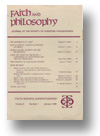|
articles |
|
1.
|
Faith and Philosophy:
Volume >
3 >
Issue: 1
Richard B. Miller
The Reference of “God”
abstract |
view |
rights & permissions
| cited by
Analytically inclined philosphers of religion have commonly assumed that 1) “God” must be defined before arguments for or against his existence can be evaluated 2) the history of religious beliefs is irrelevant to their justification. In this paper I apply the causal theory of reference to “God” and challenge both assumptions. If, as Freud supposes, “God” originates in the delusions of the mentally ill then it does not refer. On the other hand, if “God” originates in encounters with some Entity, no matter how vaguely conceived, then That is God.
|
|
|
|
|
2.
|
Faith and Philosophy:
Volume >
3 >
Issue: 1
Richard C. Potter
How to Create a Physical Universe Ex Nihilo
abstract |
view |
rights & permissions
| cited by
This paper examines the principle of creation ex nihilo as formulated by St. Augustine and contrasts it with the common-sense principle that “something cannot come from nothing.” It is argued that these two principles, if suitably interpreted, are logically consistent and a creation scenario is described in which their compatibility is demonstrated.
|
|
|
|
|
3.
|
Faith and Philosophy:
Volume >
3 >
Issue: 1
Alfred J. Freddoso
Human Nature, Potency and the Incarnation
abstract |
view |
rights & permissions
| cited by
According to the Christian doctrine of the Incarnation, the Son of God is truly but only contingently a human being. But is it also the case that Christ’s individual human nature is only contingently united to a divine person? The affirmative answer to this question, explicitly espoused by Duns Scotus and William of Ockham, turns out to be philosophically untenable, while the negative answer, which is arguably implicit in St. Thomas Aquinas, explication of the Incarnation, has some surprising and significant metaphysical consequences.
|
|
|
|
|
4.
|
Faith and Philosophy:
Volume >
3 >
Issue: 1
David Ray Griffin
Faith and Spiritual Discipline:
A Comparison of Augustinian and Process Theologies
abstract |
view |
rights & permissions
| cited by
The fact that many who are currently interested in spirituality tum to non-Christian sources is related to Augustine’s view of divine omnipotence. which was expressed supremely in his anit-Donatist and anti-Pelagian writings. Distinguishing cosmological, theological, and axiological freedom helps us see Pelgius as right on the second even though Augustine was right on the third. Process theology, by defending cosmological freedom against modem thought, theological freedom against pre-modem thought, and an element of truth in Donatism, provides the basis for a post-modem spirituality.
|
|
|
|
|
5.
|
Faith and Philosophy:
Volume >
3 >
Issue: 1
Steven G. Smith
The Evidence of God Having Spoken
abstract |
view |
rights & permissions
| cited by
God’s revelation is not uncommonly represented as a past speaking---“God has spoken,” “We have heard.” In order to study how the possibilities of reasoning are affected when the crucial evidence to which reasoning may appeal is a remembered speaking, a parableis offered in which three young brothers dispute whether their mother has called them home. Their arguments necessarily take an ad hominem tum. It is found that the claims of the brother who remembers hearing are provisionally, partially, and prescriptively reasonable. This brother’s position resembles that of St. Paul at Romans 1 :18-32 (“So they are without excuse” ).
|
|
|
|
|
book reviews |
|
6.
|
Faith and Philosophy:
Volume >
3 >
Issue: 1
Frederick Sontag
Eternal Life?:
Life after Death as a Medical, Philosophical, and Theological Problem
view |
rights & permissions
| cited by
|
|
|
|
|
7.
|
Faith and Philosophy:
Volume >
3 >
Issue: 1
Thomas V. Morris
Metaphysics:
Constructing a World View
view |
rights & permissions
| cited by
|
|
|
|
|
8.
|
Faith and Philosophy:
Volume >
3 >
Issue: 1
Edward Wierenga
Logic and the Nature of God
view |
rights & permissions
| cited by
|
|
|
|
|
9.
|
Faith and Philosophy:
Volume >
3 >
Issue: 1
Edward A. Langerak, Jr.
When the Kings Come Marching In:
Isaiah and the New Jerusalem
view |
rights & permissions
| cited by
|
|
|
|
|
10.
|
Faith and Philosophy:
Volume >
3 >
Issue: 1
F. Michael McLain
New Dimensions in Philosophical Theology
view |
rights & permissions
| cited by
|
|
|
|
